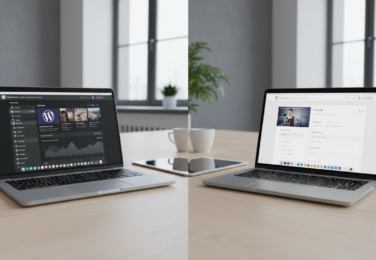how to choose the right platform for your online presence

Table of Content
In today’s digital world, having a strong online presence is key. Whether you’re starting a business, creating content, or running a company, your early choices matter a lot. I remember feeling lost when we started our web development journey. With so many platforms like WordPress, Contentful, and others, it felt like a maze.
Finding the right platform is more than just picking one. It’s about matching your brand’s needs and appealing to the Australian market. It’s about understanding growth, customisation, and ease of use. You need to decide if WordPress or Contentful is right for you, or if another system is better for your vision.
Key Takeaways
- Choosing the right platform is key for your online presence.
- Think about usability, customisation, and growth.
- See if WordPress, Contentful, or another CMS suits you.
- Your platform should match your brand and audience.
- The right CMS can boost web development and content management.
Understanding Your Online Presence Needs
Building a strong online presence starts with clear goals and knowing who you want to reach. Do you want to share information, entertain, sell, or offer a service? Each aim needs a specific CMS approach. It’s key to understand your audience’s interests, online habits, and device preferences.
Evaluating Your Goals
First, define your website goals clearly. Do you want to boost brand awareness, get more leads, or increase sales? These objectives will help pick the right cms choices. For example, an e-commerce site needs a CMS that handles transactions well. A blog might focus on easy publishing and SEO.
Identifying Your Audience
Then, figure out who you’re targeting. Knowing your audience helps shape your content and design. Are they tech-savvy millennials or older professionals who prefer desktops? This info helps tailor your online strategy to meet their needs.
Popular Platforms for Building Online Presence
Choosing the right platform is key to a strong online presence. The platform you pick affects your site’s performance, how users interact with it, and how it grows. Let’s look at some top options for building websites.
WordPress
WordPress is a top choice worldwide, loved for its ease of use and vast plugin library. It suits both newbies and seasoned developers. With themes and plugins, you can make your site professional and engaging.
Contentful
Contentful is known for its ease in managing content and growing with your site. It’s a headless CMS that lets developers manage content easily across different platforms. Its flexible API makes it great for complex content needs.
Website Builders
Website builders like Wix, Squarespace, and Weebly are perfect for those without coding skills. They offer a simple drag-and-drop interface and lots of templates. They’re great for personal sites, small businesses, or anyone wanting a quick online presence.
| Platform | Key Features | Best For |
|---|---|---|
| WordPress | User-friendly, Extensive Plugins, Customisable Themes | All levels of users, specially for customisation |
| Contentful | Scalability, Flexible API, Advanced Content Management | Developers and big companies with complex content |
| Website Builders | Drag-and-Drop Interface, Pre-Designed Templates | Beginners, Small businesses, DIY projects |
Advantages of WordPress for Web Development
WordPress is a standout as an open-source CMS, known for its versatility. It’s perfect for many web development projects. Its easy-to-use interface makes publishing content simple, great for bloggers and businesses alike.
It also has a huge selection of plugins and themes. This offers customisation options for all sorts of websites. Whether it’s a personal blog or a big business site, you’ll find tools that are easy to use and manage.
- Accessibility: WordPress is easy for anyone to use, from beginners to experts.
- Versatility: Its open-source nature lets developers add new features and improve it as needed.
- Strong Community Support: There’s a big community of users and developers ready to help with any issues.
The WordPress community keeps websites safe and up-to-date with regular updates. This means users always get the latest features and improvements. This is a big plus for web developers.
Why Choose Contentful for Your Website
In today’s digital world, picking the right platform for your website’s content is key. Contentful CMS is a top choice, thanks to its advanced features and wide range of capabilities for different business needs.
Content Management Efficiency
Contentful CMS makes efficient content management easy with its API-first approach. This method makes it simple to integrate with many digital platforms. Your content stays consistent and current everywhere.
By making content workflows smoother, Contentful boosts productivity. This means we can spend more time creating engaging content, not stuck on platform issues.
Scalability
Contentful’s scalable website architecture is a big plus for growing businesses. It works well for small blogs or big enterprise solutions. Contentful lets your website grow with your business easily.
With Contentful, companies aiming for a strong online presence find a reliable partner. It supports both simple updates and big, complex expansions.
Deciding Between WordPress or Contentful
When we compare WordPress versus Contentful, we look at several important factors. The costs and how easy it is to use are key.
Cost of Use
The CMS costs are a big deal when picking between WordPress and Contentful. WordPress is free, making it a good choice for those on a budget. But, you might need to pay for extra features and plugins.
Contentful, on the other hand, costs more upfront. But it offers advanced features for complex projects.
Ease of Use
User experience is critical in this platform comparison. WordPress is easy to use, perfect for those who aren’t tech-savvy. It has many themes and plugins to help you get started.
Contentful, while powerful, is more for developers. It’s flexible but can be harder to learn.
| Platform | Initial CMS Costs | User Experience |
|---|---|---|
| WordPress | Low | Intuitive and beginner-friendly |
| Contentful | High | Flexible for developers, steeper learning curve |
Website Builders: A Versatile Choice
Website builders make creating a website easy and fun. They offer a mix of simplicity and customisation. This means we can make professional-looking sites without needing to know a lot of tech stuff.
These builders come with lots of custom templates. Whether you want something modern or classic, there’s a template for you. This makes it easy to create a site that shows off your brand’s style.
DIY Options
DIY website creation gives us the power to build our own sites. With easy-to-use tools, we can arrange elements just the way we like. This means we don’t have to hire web developers, saving time and money.
Templates and Themes
There are many theme options to choose from. You can pick themes that match your project’s needs. These themes look great on any device and are easy to use.
In short, website builders with lots of themes and templates are super flexible. They make creating a website easy for everyone. This way, web development is no longer a mystery.
SEO Optimisation on Different Online Platforms
SEO is key for any online presence, making sure we’re seen online. WordPress and Contentful each have their own way to help with this.
WordPress Plugins
WordPress stands out with its wide range of SEO plugins. Tools like Yoast SEO make SEO easier by guiding you through important steps. They help with things like metadata, keywords, and readability.
These plugins are easy to add to your site. They offer great SEO solutions with little effort needed.
Contentful SEO Capabilities
Contentful lets us tweak SEO features right from its content delivery API. This gives a more tailored SEO approach. It needs more technical know-how than WordPress plugins but offers custom SEO plans.
With Contentful’s SEO tools, developers can create unique SEO strategies. This boosts online visibility while keeping content management flexible.
Customisation Flexibility
WordPress and Contentful both offer unique benefits for website customisation. WordPress is known for its easy customisation through many themes and plugins. It’s perfect for those who want a unique site without getting too technical.

Contentful, on the other hand, is a *flexible CMS* with an API-centric model. It’s great for detailed customisation but needs a developer to unlock its full power. Contentful is ideal for creating custom digital experiences. The choice between WordPress and Contentful depends on how much personalisation you want and your technical skills.
How CMS Choices Affect Blogging Capabilities
Choosing the right content management system (CMS) is key for bloggers. It affects how we make, manage, and share our content. Let’s look at how WordPress and Contentful impact our blogging.
WordPress Blogging Features
WordPress is a top blogging platform with many features for bloggers. It has pre-built themes and an easy editor for creating posts. The WordPress features let us add multimedia, handle comments, and use SEO plugins for better visibility.
It’s great for bloggers who want an easy-to-use interface and lots of functions.
Contentful Blogging Extensions
Contentful isn’t just a blogging platform, but it offers special benefits. Its modular content model lets us use Contentful extensions to organise data better. These tools give a new way to make content, perfect for those who want to customise their blog.
Contentful is ideal for those who need more control over their content.
When we compare these CMS options, WordPress is great for its built-in blogging tools. Contentful stands out for its flexibility with extensions.
Security Considerations
Building a secure online presence is key. Both WordPress and Contentful have strong security features. But, WordPress’s popularity makes it a bigger target for hackers if not updated regularly.
For WordPress users, keeping the site updated is critical. Using security plugins like Wordfence and Sucuri is also important. These tools help monitor traffic, set up firewalls, and scan for malware.
Contentful takes a different approach to security. Its structured content delivery method naturally protects data. This makes Contentful a safe choice for those who value security.
Let’s compare WordPress and Contentful’s security features:
| Security Aspect | WordPress | Contentful |
|---|---|---|
| Update Frequency | Regular updates required | Structured and less frequent |
| Security Plugins | Extensive plugin library (e.g., Wordfence, Sucuri) | API-first architecture for enhanced security |
| Data Protection | Dependent on user-implemented security practices | Inherent protection built into the platform |
Both WordPress and Contentful need a proactive security approach. WordPress users should update regularly and use plugins. Contentful’s built-in security features are a strong advantage. By understanding these, we can create a safe website for our users.
Choosing a Platform Based on Content Management System Needs
When picking a CMS, think about how it fits your needs for content updates and user permissions. Each platform offers different levels of personalisation and role management. These can greatly affect your team’s work and how you all collaborate.
Ease of Content Updates
WordPress is known for being easy to use, perfect for those who update content often but aren’t tech-savvy. Its simple design lets us manage content well without needing to know a lot about tech. On the other hand, Contentful is more complex but very flexible. It’s great for companies that need to organise and edit content in a detailed way.
User Permissions and Roles
Good role management is also key. WordPress makes it easy to control who can do what with your content. This is good for small teams or simple projects. But Contentful offers more detailed access controls and user permissions. This is better for bigger teams that need complex workflows and strict content rules.

Web Development Support and Community
Choosing the right platform for your online presence is key. The level of web development support and the CMS community’s strength are vital. WordPress shines with its vast global community, providing a wealth of online resources and forums for help.
Need help with a complex problem or just some advice? The WordPress CMS community is always ready to assist. It includes freelancers, professional developers, and hobbyists who share plugins, themes, and solutions.
Contentful, on the other hand, offers web development support tailored for developers. It has official support channels and community-led initiatives. These provide valuable online resources and technical assistance. Contentful’s community focuses more on APIs and integrations, catering to those with a technical background.
| Feature | WordPress | Contentful |
|---|---|---|
| Community Size | Large and Global | Smaller, Developer-Focused |
| Web Development Support | Extensive Documentation and Forums | Detailed API Documentation and Dev Community |
| Online Resources | Abundant and Varied | Comprehensive but Niche |
| Technical Assistance | Community-Driven Help and Tutorials | Official Support and Developer Guides |
Choosing between WordPress and Contentful depends on your technical skills and support needs. Do you want a wide range of online resources and community insights, or focused, technical support? Both platforms offer strong assistance but suit different user needs.
Conclusion
Choosing the right CMS for your online presence is key. You need to look at what WordPress and Contentful offer. Think about cost, ease of use, and how well it will grow with your business.
WordPress is great for bloggers with its many plugins and custom options. Contentful is perfect for businesses needing top-notch content management and scalability. Your needs will decide which one is best for you.
At Defyn.com.au, we’re here to help you build a strong online presence. If you’re looking at Shopify or other platforms, our Australian team is ready to assist. Contact us at hello@defyn.com.au for custom support and web development advice.










